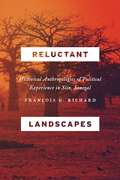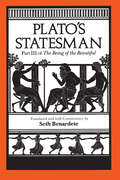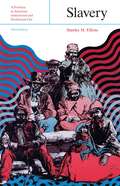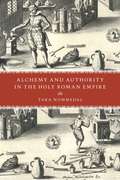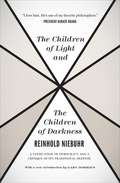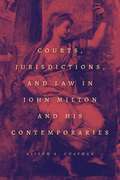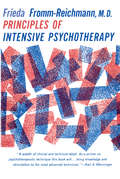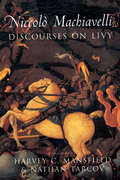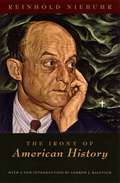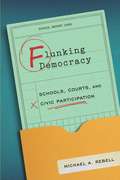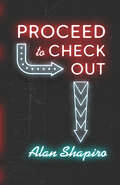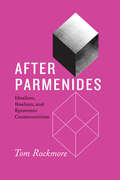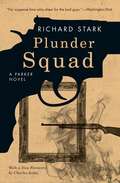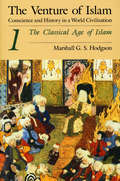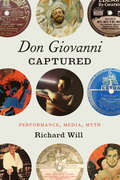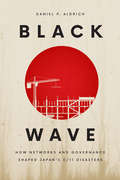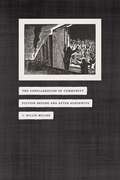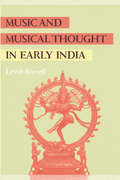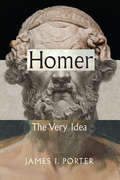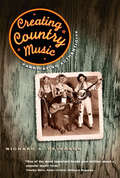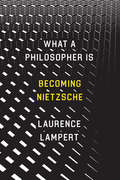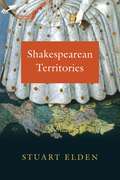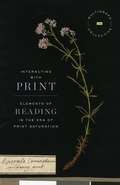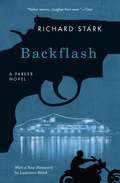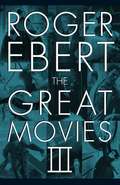- Table View
- List View
Reluctant Landscapes: Historical Anthropologies of Political Experience in Siin, Senegal
by Francois G. RichardWest African history is inseparable from the history of the Atlantic slave trade and colonialism. According to historical archaeologist François Richard, however, the dominance of this narrative not only colors the range of political discourse about Africa but also occludes many lesser-known—but equally important—experiences of those living in the region. Reluctant Landscapes is an exploration of the making and remaking of political experience and physical landscapes among rural communities in the Siin province of Senegal between the late 1500s and the onset of World War II. By recovering the histories of farmers and commoners who made up African states’ demographic core in this period, Richard shows their crucial—but often overlooked—role in the making of Siin history. The book also delves into the fraught relation between the Seereer, a minority ethnic and religious group, and the Senegalese nation-state, with Siin’s perceived “primitive” conservatism standing at odds with the country’s Islamic modernity. Through a deep engagement with oral, documentary, archaeological, and ethnographic archives, Richard’s groundbreaking study revisits the four-hundred-year history of a rural community shunted to the margins of Senegal’s national imagination.
Plato's Statesman: Part III of The Being of the Beautiful
by PlatoTheaetetus, the Sophist, and the Statesman are a trilogy of Platonic dialogues that show Socrates formulating his conception of philosophy as he prepares the defense for his trial. Originally published together as The Being of the Beautiful, these translations can be read separately or as a trilogy. Each includes an introduction, extensive notes, and comprehensive commentary that examines the trilogy's motifs and relationships. "Seth Benardete is one of the very few contemporary classicists who combine the highest philological competence with a subtlety and taste that approximate that of the ancients. At the same time, he as set himself the entirely modern hermeneutical task of uncovering what the ancients preferred to keep veiled, of making explicit what they indicated, and hence...of showing the naked ugliness of artificial beauty."—Stanley Rose, Graduate Faculty Philosophy Journal Seth Benardete (1930-2001) was professor of classics at New York University. He was the author or translator of many books, most recently The Argument of the Action, Plato's "Laws," and Plato's "Symposium," all published by the University of Chicago Press.
Slavery: A Problem in American Institutional and Intellectual Life
by Stanley M. ElkinsThis third edition of Stanley M. Elkin's classic study offers two new chapters by the author. The first, "Slavery and Ideology," considers the discussion and criticism occasioned by this controversial work. Elkins amplifies his original purpose in writing the book and takes into consideration the substantial body of critical commentary. He also attempts a prediction on the course of future research and discussion.
Alchemy and Authority in the Holy Roman Empire (National Society For The Study Of Education Yearbooks Ser.)
by Tara NummedalWhat distinguished the true alchemist from the fraud? This question animated the lives and labors of the common men—and occasionally women—who made a living as alchemists in the sixteenth- and seventeenth-century Holy Roman Empire. As purveyors of practical techniques, inventions, and cures, these entrepreneurs were prized by princely patrons, who relied upon alchemists to bolster their political fortunes. At the same time, satirists, artists, and other commentators used the figure of the alchemist as a symbol for Europe’s social and economic ills. Drawing on criminal trial records, contracts, laboratory inventories, satires, and vernacular alchemical treatises, Alchemy and Authority in the Holy Roman Empire situates the everyday alchemists, largely invisible to modern scholars until now, at the center of the development of early modern science and commerce. Reconstructing the workaday world of entrepreneurial alchemists, Tara Nummedal shows how allegations of fraud shaped their practices and prospects. These debates not only reveal enormously diverse understandings of what the “real” alchemy was and who could practice it; they also connect a set of little-known practitioners to the largest questions about commerce, trust, and intellectual authority in early modern Europe.
The Children of Light and the Children of Darkness: A Vindication of Democracy and a Critique of Its Traditional Defense
by Reinhold NiebuhrThe Children of Light and the Children of Darkness, first published in 1944, is considered one of the most profound and relevant works by the influential theologian Reinhold Niebuhr, and certainly the fullest statement of his political philosophy. Written and first read during the prolonged, tragic world war between totalitarian and democratic forces, Niebuhr’s book took up the timely question of how democracy as a political system could best be defended. Most proponents of democracy, Niebuhr claimed, were “children of light,” who had optimistic but naïve ideas about how society could be rid of evil and governed by enlightened reason. They needed, he believed, to absorb some of the wisdom and strength of the “children of darkness,” whose ruthless cynicism and corrupt, anti-democratic politics should otherwise be repudiated. He argued for a prudent, liberal understanding of human society that took the measure of every group’s self-interest and was chastened by a realistic understanding of the limits of power. It is in the foreword to this book that he wrote, “Man’s capacity for justice makes democracy possible; but man’s inclination to injustice makes democracy necessary.”This edition includes a new introduction by the theologian and Niebuhr scholar Gary Dorrien in which he elucidates the work’s significance and places it firmly into the arc of Niebuhr’s career.
Courts, Jurisdictions, and Law in John Milton and His Contemporaries
by Alison A. ChapmanJohn Milton is widely known as the poet of liberty and freedom. But his commitment to justice has been often overlooked. As Alison A. Chapman shows, Milton’s many prose works are saturated in legal ways of thinking, and he also actively shifts between citing Roman, common, and ecclesiastical law to best suit his purpose in any given text. This book provides literary scholars with a working knowledge of the multiple, jostling, real-world legal systems in conflict in seventeenth-century England and brings to light Milton’s use of the various legal systems and vocabularies of the time—natural versus positive law, for example—and the differences between them. Surveying Milton’s early pamphlets, divorce tracts, late political tracts, and major prose works in comparison with the writings and cases of some of Milton’s contemporaries—including George Herbert, John Donne, Ben Jonson, and John Bunyan—Chapman reveals the variety and nuance in Milton’s juridical toolkit and his subtle use of competing legal traditions in pursuit of justice.
Principles of Intensive Psychotherapy
by Frieda Fromm-Reichmann M.D."[This book has] a wealth of clinical and technical detail. As a primer on psychotherapeutic technique this book will. . .bring knowledge and stimulation to the most advanced technician"—Karl A. Menninger "One is continuously aware that here is a truly human being at work, human in the sense of exquisite awareness, on a profoundly intuitive level, of the workings of the human totality. . . . Because of this she can bridge the vast divide that separates us from the psychotic . . . thereby gaining access to the process of recalling the patient to his lost domain."—Louise E. DeRosis, M.D., American Journal of Psychoanalysis
Discourses on Livy
by Niccolò MachiavelliDiscourses on Livy is the founding document of modern republicanism, and Harvey C. Mansfield and Nathan Tarcov have provided the definitive English translation of this classic work. Faithful to the original Italian text, properly attentive to Machiavelli's idiom and subtlety of thought, it is eminently readable. With a substantial introduction, extensive explanatory notes, a glossary of key words, and an annotated index, the Discourses reveals Machiavelli's radical vision of a new science of politics, a vision of "new modes and orders" that continue to shape the modern ethos. "[Machiavelli] found in Livy the means to inspire scholars for five centuries. Within the Discourses, often hidden and sometimes unintended by their author, lie the seeds of modern political thought. . . . [Mansfield and Tarcov's] translation is careful and idiomatic."—Peter Stothard, The Times "Translated with painstaking accuracy—but also great readability."—Weekly Standard "A model of contemporary scholarship and a brave effort at Machiavelli translation that allows the great Florentine to speak in his own voice."—Choice
The Irony of American History: Leaves From The Notebook Of A Tamed Cynic / Moral Man And Immoral Society / The Children Of Light And The Children Of Darkness / The Irony Of American History
by Reinhold Niebuhr“[Niebuhr] is one of my favorite philosophers. I take away [from his works] the compelling idea that there’s serious evil in the world, and hardship and pain. And we should be humble and modest in our belief we can eliminate those things. But we shouldn’t use that as an excuse for cynicism and inaction. I take away . . . the sense we have to make these efforts knowing they are hard.”—President Barack Obama Forged during the tumultuous but triumphant postwar years when America came of age as a world power, The Irony of American History is more relevant now than ever before. Cited by politicians as diverse as Hillary Clinton and John McCain, Niebuhr’s masterpiece on the incongruity between personal ideals and political reality is both an indictment of American moral complacency and a warning against the arrogance of virtue. Impassioned, eloquent, and deeply perceptive, Niebuhr’s wisdom will cause readers to rethink their assumptions about right and wrong, war and peace. “The supreme American theologian of the twentieth century.”—Arthur Schlesinger Jr., New York Times “Niebuhr is important for the left today precisely because he warned about America’s tendency—including the left’s tendency—to do bad things in the name of idealism. His thought offers a much better understanding of where the Bush administration went wrong in Iraq.”—Kevin Mattson, The Good Society “Irony provides the master key to understanding the myths and delusions that underpin American statecraft. . . . The most important book ever written on US foreign policy.”—Andrew J. Bacevich, from the Introduction
Flunking Democracy: Schools, Courts, and Civic Participation
by Michael A. RebellThe 2016 presidential election campaign and its aftermath have underscored worrisome trends in the present state of our democracy: the extreme polarization of the electorate, the dismissal of people with opposing views, and the widespread acceptance and circulation of one-sided and factually erroneous information. Only a small proportion of those who are eligible actually vote, and a declining number of citizens actively participate in local community activities. In Flunking Democracy, Michael A. Rebell makes the case that this is not a recent problem, but rather that for generations now, America’s schools have systematically failed to prepare students to be capable citizens. Rebell analyzes the causes of this failure, provides a detailed analysis of what we know about how to prepare students for productive citizenship, and considers examples of best practices. Rebell further argues that this civic decline is also a legal failure—a gross violation of both federal and state constitutions that can only be addressed by the courts. Flunking Democracy concludes with specific recommendations for how the courts can and should address this deficiency, and is essential reading for anyone interested in education, the law, and democratic society.
Proceed to Check Out (Phoenix Poets)
by Alan ShapiroAward-winning poet Alan Shapiro offers a new collection of poems reflecting on mortality and finitude. Alan Shapiro’s fourteenth collection of poetry, Proceed to Check Out, is a kind of summing up, or stock-taking, by an aging poet, of his precarious place in a world dominated by the ever-accelerating pace of technological innovation, political disruption, personal loss, and racial strife. These poems take on fundamental subjects—like the nature of time and consciousness and how or why we become who we are—but Shapiro presses them into becoming urgent and timely. Employing idiomatic range and formal variety, Shapiro’s poems move through recurring dreams, the coercions of childhood, and the mysterious connections of mind and matter, pleasure and memory. They meet an abiding need to find empathy and understanding in even the most challenging places—amid disaffection, public discord, and estrangement. His grasp of contemporary life—in all its insidious violence and beauty—is distinct, comprehensive, and profound.
After Parmenides: Idealism, Realism, and Epistemic Constructivism
by Tom RockmoreEngages with one of the oldest philosophical problems—the relationship between thought and being—and offers a fresh perspective with which to approach the long history of this puzzle. In After Parmenides, Tom Rockmore takes us all the way back to the beginning of Western philosophy, when Parmenides asserted that thought and being are the same. This idea created a division between what the mind constructs as knowable entities and the idea that there is also a mind-independent real, which we can know or fail to know. Rockmore argues that we need to give up on the idea of knowing the real as it is, and instead focus on the objects of cognition that our mind constructs. Though we cannot know mind-independent objects as they “really” are, we can and do know objects as they appear to us.After Parmenides charts the continual engagement with these ideas of the real and the knowable throughout philosophical history from Plato and Aristotle to Descartes, Kant, Fichte, Hegel, Schopenhauer, Marx, and others. This ambitious book shows how new connections can be made in the history of philosophy when it is reread through a new lens.
Plunder Squad: A Parker Novel (The Parker Novels)
by Richard Stark“Hearing the click behind him, Parker threw his glass straight back over his right shoulder, and dove off his chair to the left.” When a job looks like amateur hour, Parker walks away. But even a squad of seasoned professionals can’t guarantee against human error in a high-risk scam. Can an art dealer with issues unload a truck of paintings with Parker’s aid? Or will the heist end up too much of a human interest story, as luck runs out before Parker can get in on the score?
The Classical Age of Islam: The Classical Age Of Islam (The Venture of Islam: Conscience and History in a World Civilization)
by Marshall G.S. HodgsonThe Venture of Islam has been honored as a magisterial work of the mind since its publication in early 1975. In this three-volume study, illustrated with charts and maps, Hodgson traces and interprets the historical development of Islamic civilization from before the birth of Muhammad to the middle of the twentieth century. This work grew out of the famous course on Islamic civilization that Hodgson created and taught for many years at the University of Chicago. "This is a nonpareil work, not only because of its command of its subject but also because it demonstrates how, ideally, history should be written."—The New Yorker Volume 1, The Classical Age of Islam, analyzes the world before Islam, Muhammad's challenge, and the early Muslim state between 625 and 692. Hodgson then discusses the classical civilization of the High Caliphate. The volume also contains a general introduction to the complete work and a foreword by Reuben Smith, who, as Hodgson's colleague and friend, finished the Venture of Islam after the author's death and saw it through to publication.
Don Giovanni Captured: Performance, Media, Myth (Opera Lab: Explorations In History, Technology, And Performance Ser.)
by Richard Will“Don Giovanni” Captured considers the life of a single opera, engaging with the entire history of its recorded performance. Mozart’s opera Don Giovanni has long inspired myths about eros and masculinity. Over time, its performance history has revealed a growing trend toward critique—an increasing effort on the part of performers and directors to highlight the violence and predatoriness of the libertine central character, alongside the suffering and resilience of his female victims. In “Don Giovanni” Captured, Richard Will sets out to analyze more than a century’s worth of recorded performances of the opera, tracing the ways it has changed from one performance to another and from one generation to the next. Will consults audio recordings, starting with wax cylinders and 78s, as well as video recordings, including DVDs, films, and streaming videos. As Will argues, recordings and other media shape our experience of opera as much as live performance does. Seen as a historical record, opera recordings are also a potent reminder of the refusal of works such as Don Giovanni to sit still. By choosing a work with such a rich and complex tradition of interpretation, Will helps us see Don Giovanni as a standard-bearer for evolving ideas about desire and power, both on and off the stage.
Black Wave: How Networks and Governance Shaped Japan’s 3/11 Disasters
by Daniel P. AldrichDespite the devastation caused by the magnitude 9.0 earthquake and 60-foot tsunami that struck Japan in 2011, some 96% of those living and working in the most disaster-stricken region of Tohoku made it through. Smaller earthquakes and tsunamis have killed far more people in nearby China and India. What accounts for the exceptionally high survival rate? And why is it that some towns and cities in the Tohoku region have built back more quickly than others? Black Wave illuminates two critical factors that had a direct influence on why survival rates varied so much across the Tohoku region following the 3/11 disasters and why the rebuilding process has also not moved in lockstep across the region. Individuals and communities with stronger networks and better governance, Daniel P. Aldrich shows, had higher survival rates and accelerated recoveries. Less-connected communities with fewer such ties faced harder recovery processes and lower survival rates. Beyond the individual and neighborhood levels of survival and recovery, the rebuilding process has varied greatly, as some towns and cities have sought to work independently on rebuilding plans, ignoring recommendations from the national government and moving quickly to institute their own visions, while others have followed the guidelines offered by Tokyo-based bureaucrats for economic development and rebuilding.
The Conflagration of Community: Fiction before and after Auschwitz
by J. Hillis Miller“After Auschwitz to write even a single poem is barbaric.” The Conflagration of Community challenges Theodor Adorno’s famous statement about aesthetic production after the Holocaust, arguing for the possibility of literature to bear witness to extreme collective and personal experiences. J. Hillis Miller masterfully considers how novels about the Holocaust relate to fictions written before and after it, and uses theories of community from Jean-Luc Nancy and Derrida to explore the dissolution of community bonds in its wake.Miller juxtaposes readings of books about the Holocaust—Keneally’s Schindler’s List, McEwan’s Black Dogs, Spiegelman’s Maus, and Kertész’s Fatelessness—with Kafka’s novels and Morrison’s Beloved, asking what it means to think of texts as acts of testimony. Throughout, Miller questions the resonance between the difficulty of imagining, understanding, or remembering Auschwitz—a difficulty so often a theme in records of the Holocaust—and the exasperating resistance to clear, conclusive interpretation of these novels. The Conflagration of Community is an eloquent study of literature’s value to fathoming the unfathomable.
Music and Musical Thought in Early India (Chicago Studies In Ethnomusicology Ser.)
by Lewis RowellOffering a broad perspective of the philosophy, theory, and aesthetics of early Indian music and musical ideology, this study makes a unique contribution to our knowledge of the ancient foundations of India's musical culture. Lewis Rowell reconstructs the tunings, scales, modes, rhythms, gestures, formal patterns, and genres of Indian music from Vedic times to the thirteenth century, presenting not so much a history as a thematic analysis and interpretation of India's magnificent musical heritage. In Indian culture, music forms an integral part of a broad framework of ideas that includes philosophy, cosmology, religion, literature, and science. Rowell works with the known theoretical treatises and the oral tradition in an effort to place the technical details of musical practice in their full cultural context. Many quotations from the original Sanskrit appear here in English translation for the first time, and the necessary technical information is presented in terms accessible to the nonspecialist. These features, combined with Rowell's glossary of Sanskrit terms and extensive bibliography, make Music and Musical Thought in Early India an excellent introduction for the general reader and an indispensable reference for ethnomusicologists, historical musicologists, music theorists, and Indologists.
Homer: The Very Idea
by James I. PorterThe story of our ongoing fascination with Homer, the man and the myth. Homer, the great poet of the Iliad and the Odyssey, is revered as a cultural icon of antiquity and a figure of lasting influence. But his identity is shrouded in questions about who he was, when he lived, and whether he was an actual person, a myth, or merely a shared idea. Rather than attempting to solve the mystery of this character, James I. Porter explores the sources of Homer’s mystique and their impact since the first recorded mentions of Homer in ancient Greece. Homer: The Very Idea considers Homer not as a man, but as a cultural invention nearly as distinctive and important as the poems attributed to him, following the cultural history of an idea and of the obsession that is reborn every time Homer is imagined. Offering novel readings of texts and objects, the book follows the very idea of Homer from his earliest mentions to his most recent imaginings in literature, criticism, philosophy, visual art, and classical archaeology.
Creating Country Music: Fabricating Authenticity
by Richard A. PetersonIn Creating Country Music, Richard Peterson traces the development of country music and its institutionalization from Fiddlin' John Carson's pioneering recordings in Atlanta in 1923 to the posthumous success of Hank Williams. Peterson captures the free-wheeling entrepreneurial spirit of the era, detailing the activities of the key promoters who sculpted the emerging country music scene. More than just a history of the music and its performers, this book is the first to explore what it means to be authentic within popular culture. "[Peterson] restores to the music a sense of fun and diversity and possibility that more naive fans (and performers) miss. Like Buck Owens, Peterson knows there is no greater adventure or challenge than to 'act naturally.'"—Ken Emerson, Los Angeles Times Book Review "A triumphal history and theory of the country music industry between 1920 and 1953."—Robert Crowley, International Journal of Comparative Sociology "One of the most important books ever written about a popular music form."—Timothy White, Billboard Magazine
What a Philosopher Is: Becoming Nietzsche
by Laurence LampertThe trajectory of Friedrich Nietzsche’s thought has long presented a difficulty for the study of his philosophy. How did the young Nietzsche—classicist and ardent advocate of Wagner’s cultural renewal—become the philosopher of Will to Power and the Eternal Return? With this book, Laurence Lampert answers that question. He does so through his trademark technique of close readings of key works in Nietzsche’s journey to philosophy: The Birth of Tragedy, Schopenhauer as Educator, Richard Wagner in Bayreuth, Human All Too Human, and “Sanctus Januarius,” the final book of the 1882 Gay Science. Relying partly on how Nietzsche himself characterized his books in his many autobiographical guides to the trajectory of his thought, Lampert sets each in the context of Nietzsche’s writings as a whole, and looks at how they individually treat the question of what a philosopher is. Indispensable to his conclusions are the workbooks in which Nietzsche first recorded his advances, especially the 1881 workbook which shows him gradually gaining insights into the two foundations of his mature thinking. The result is the most complete picture we’ve had yet of the philosopher’s development, one that gives us a Promethean Nietzsche, gaining knowledge even as he was expanding his thought to create new worlds.
Shakespearean Territories
by Stuart EldenShakespeare was an astute observer of contemporary life, culture, and politics. The emerging practice of territory as a political concept and technology did not elude his attention. In Shakespearean Territories, Stuart Elden reveals just how much Shakespeare’s unique historical position and political understanding can teach us about territory. Shakespeare dramatized a world of technological advances in measuring, navigation, cartography, and surveying, and his plays open up important ways of thinking about strategy, economy, the law, and colonialism, providing critical insight into a significant juncture in history. Shakespeare’s plays explore many territorial themes: from the division of the kingdom in King Lear, to the relations among Denmark, Norway, and Poland in Hamlet, to questions of disputed land and the politics of banishment in Richard II. Elden traces how Shakespeare developed a nuanced understanding of the complicated concept and practice of territory and, more broadly, the political-geographical relations between people, power, and place. A meticulously researched study of over a dozen classic plays, Shakespearean Territories will provide new insights for geographers, political theorists, and Shakespearean scholars alike.
Interacting with Print: Elements of Reading in the Era of Print Saturation (The Multigraph Collective)
by The Multigraph CollectiveA thorough rethinking of a field deserves to take a shape that is in itself new. Interacting with Print delivers on this premise, reworking the history of print through a unique effort in authorial collaboration. The book itself is not a typical monograph—rather, it is a “multigraph,” the collective work of twenty-two scholars who together have assembled an alphabetically arranged tour of key concepts for the study of print culture, from Anthologies and Binding to Publicity and Taste. Each entry builds on its term in order to resituate print and book history within a broader media ecology throughout the eighteenth and nineteenth centuries. The central theme is interactivity, in three senses: people interacting with print; print interacting with the non-print media that it has long been thought, erroneously, to have displaced; and people interacting with each other through print. The resulting book will introduce new energy to the field of print studies and lead to considerable new avenues of investigation.
Backflash: A Parker Novel (The Parker Novels)
by Richard StarkParker's got a couple of rules that have helped keep him alive throughout his long career. One of those is never to work on a boat. But with a gambling boat cruising down the Hudson, stuffed to the gunwales with cash, Parker’s got a plan, a team, and a new rule: a shot at a big enough score makes any rule worth breaking. Parker and his crew hit the boat, hard, but as always, there are a lot of complications—and a lot of bodies—before this one's in the bag.
The Great Movies III
by Roger EbertRoger Ebert has been writing film reviews for the Chicago Sun-Times for over four decades now and his biweekly essays on great movies have been appearing there since 1996. As Ebert noted in the introduction to the first collection of those pieces, “They are not the greatest films of all time, because all lists of great movies are a foolish attempt to codify works which must stand alone. But it’s fair to say: If you want to take a tour of the landmarks of the first century of cinema, start here. Enter The Great Movies III, Ebert’s third collection of essays on the crème de la crème of the silver screen, each one a model of critical appreciation and a blend of love and analysis that will send readers back to the films with a fresh set of eyes and renewed enthusiasm—or maybe even lead to a first-time viewing. From The Godfather: Part II to Groundhog Day, from The Last Picture Show to Last Tango in Paris, the hundred pieces gathered here display a welcome balance between the familiar and the esoteric, spanning Hollywood blockbusters and hidden gems, independent works and foreign language films alike. Each essay draws on Ebert’s vast knowledge of the cinema, its fascinating history, and its breadth of techniques, introducing newcomers to some of the most exceptional movies ever made, while revealing new insights to connoisseurs as well. Named the most powerful pundit in America by Forbes magazine, and a winner of the Pulitzer Prize, Roger Ebert is inarguably the most prominent and influential authority on the cinema today. The Great Movies III is sure to please his many fans and further enhance his reputation as America’s most respected—and trusted—film critic.
